Cannes journalists have been talking about how jammed Saturday is. The worry obviously isn’t about seeing at least four if not five films today, but finding time to file. Most are going to Mike Leigh‘s Another Year this morning at 8:30 am (45 minutes hence) but I’ll be catching the 9 am Directors Fortnight showing of Cam Archer‘s Shit Year. Then comes Woody Allen‘s You Will Meet a Tall Dark Stranger at 11:30 am, and then Charles Ferguson‘s Inside Job at 1:30 pm. I then have a 4pm choice between Gregg Araki‘s Kaboom or a market screening of Taylor Hackford‘s Love Ranch. And then finally Rubber, the crazy killer-tire movie, which screens sometime tonight around 8 or 9 pm.
Day: May 14, 2010
Biutiful Buzz
A guy who spoke to Sean Penn (and vice versa) mentioned to another who told me tonight at the lavish Abu Dhabi party that Penn has seen Alejandro Gonzalez Inarritu‘s Biutiful, which screens early Monday morning at the Cannes Film Festival, and that he was melted and creamola-ed and shattered. And that this Spanish-spoken, Barcelona-shot drama is…you know, the absolute total shit. (What do I know? Less than nothing.) And that star Javier Bardem‘s performance is so good it’s on a level of “forget it, hombre!” Are you going to question the reliability of third-hand party chatter?
Unfortunate Turn
Well, I guess things don’t look so hot right now for the “let it go because Roman Polanski is an art god” argument, do they? Yes, I’ll admit it — the indications are damning. But why did Charlotte Lewis, an actress who hasn’t worked since the ’90s, wait 28 years to make her statement about RoPo? And is anyone going to claim with a straight face that this wasn’t some kind of slick sleaze maneuver orchestrated by the L.A. district attorney’s office?
Kubrick Turns In Grave
Restoration guru Robert Harris, who orchestrated the immaculate and much-respected 1991 restoration of Stanley Kubrick‘s Spartacus, has sharply criticized Universal Home Video’s soon-to-be-released Bluray of this 1960 epic. Actually, “sharply criticized” doesn’t quite describe it. “Torn it a new one” is closer.
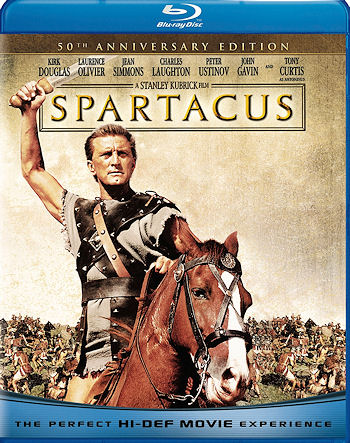
The film that Harris painstakingly restored has been turned “into a sideshow pipsqueak, an ugly and unfortunate bit of home video fodder, which would be far better suited to VHS,” he writes in a 5.12 Home Theatre Forum posting. “I would suggest a recall. Spartacus on Blu-ray could have been as Mr. Kubrick wished it to be — a heroic and majestic piece of epic entertainment. With a simple new image harvest, Spartacus could be a piece of brilliant Blu-ray software.
“As it is, Spartacus receives an absolute and undeniable fail.
“After doing a comparison of the HD vs. the new Blu-ray, here’s what I’m seeing:
“The video noise, inherent in the HD master, is gone. That’s a good thing, but keep in mind that it should never have been there to begin with. In removing the noise, all grain is also gone, replaced by what appears to be a pleasant sheen of artificial film grain.
“All of the detail captured by Academy Award winning cinematographer Russell Metty‘s meticulous large format Technirama camera, for which he won an Academy Award for Best Color Cinematography, is unfortunately also gone.
“All high frequency information has been lost, and with it all of the detail in the image.
“In its place the newly softened image has been electronically sharpened. We now have a halo. Contrast has been boosted to make the image appear sharper than it is, but this is perceived as opposed to actual sharpness. Fortunately, possibly based upon the new software, we have not gone plastic.
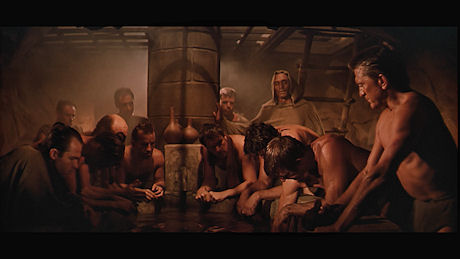
“During the restoration of Spartacus, we went through numerous tests to find the optics that could reproduce the immense amount of detail found in the original elements. I recall one test that we screened in the Hitchcock Theater at Universal. The image quality wasn’t quite there. It was slightly soft. When I mentioned that detail was missing in the wood that surrounded the gladiator’s arena, one of the gentlemen from the post house responded ‘But you can see the wood grain.’
“I distinctly remember getting an elbow in the ribs at that moment from our tech assistant, Mike Hyatt. He knew where this was going. What we needed to properly represent Mr. Kubrick’s film was not the ability to see the wood grain, but rather to see the insects eating their way through the wood grain. Within two weeks an optical system was put in place that enabled us to reproduce the information as exposed to the original elements.
“In Universal’s new Blu-ray release of Stanley Kubrick’s Spartacus, you can almost see the wood grain, but now that grain is covered in electronic enhancement, halos and unnecessary contrast.
“The pity is that Spartacus, like Out of Africa and Elizabeth, makes Blu-ray appear to be something that it is not — a flawed technological system for viewing motion pictures in home theaters. I was hopeful that the lessons learned with the Blu-ray releases of Patton, The Longest Day and Gangs of New York might have been taken to heart.
“They have not.”
Gang's All Here
I had this Wall Street 2 press conference clip all loaded and ready to go as I was writing my review this morning, and then accidentally erased it. Better late than never.
Secret Stalls
There are no facilities inside the American Pavillion, or any of the other pavillions for that matter. So it helps to know about a certain white-tiled room inside the rear entrance of the Grand Palais. It’s not advertised, there are no signs, and the French-speaking staffers with the shades and the blue blazers may not tell you — you just have to know.
Reversal of Fortune
Oliver Stone‘s Wall Street 2: Money Never Sleeps (20th Century Fox, 9.24) is an intelligent, briskly paced, rat-a-tat financial tale that moves along nicely for the first 75% to 80% of its running time — not brilliantly but sufficiently, offering a more-or-less decent ride. And then it blows itself up during the last 25 minutes or so.
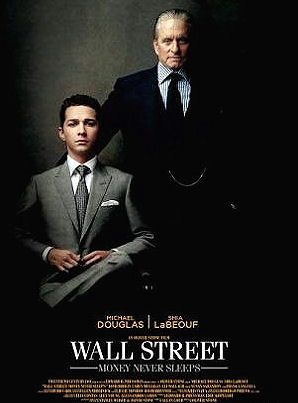
Or so it seemed to me. Some have told me they disagree, but I know (or think I know) when a film is gutting itself emotionally. WS2 does this with a sudden turnabout in the character and actions of Michael Douglas‘s Gordon Gekko character, and I can’t figure any way to explain this without announcing that spoilers are just around the corner.
WS2 screened this morning for Cannes Film Festival press. I saw it a couple of days ago at the Star plex on rue d’Antibes.
The Manhattan-based drama takes place 21 years after the 1987 original, and uses the 2008 stock market meltdown as a major plot point. But it’s primarily a family drama about a son (Shia Lebeouf‘s Jake Moore), two fathers (Gekko and Frank Langella‘s Lewis Zabel, a first-act presence whom Jake regards as a mentor), and a daughter (Carey Mulligan‘s Winnie Gekko).
The Gordon-Winnie relationship is the core of the thing. After serving seven or eight years for insider trading and being released in 2000, Gekko has become an author of a Wall Street tell-all book and, we’re told repeatedly, a genuinely reformed whore — an infamous Wall Street shark who’s not only seen the error of his ways, and who wants to be a good and caring father to Winnie. And yet she despises him for his selfishness and bad parenting that resulted, she believes, in the drug-related death of her brother (and Gekko’s son).
This echoes into Douglas’s own life, of course, as it mirrors to some extent the drug-related troubles of his son Cameron, who was recently sentenced to prison on a drug charge. Douglas has beaten himself up over this in interviews, acknowledging that he’s probably responsible on some level due to having been an indifferent or absentee parent during his 1980s and ’90s heyday.
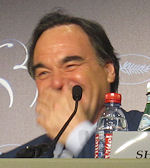
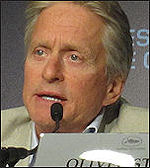

Oliver Stone, Michael Douglas, Carey Mulligan during this morning’s press conference for Wall Street 2: Money Never Sleeps.
The plot is partly about Jake wanting to stick it to Josh Brolin‘s Bretton James, a high-level trader who ruined Zabel and, Jake believes, more or less goaded the old lion into suicide, and his teaming with Gekko in order to manage this. It’s also about Jake acting as a kind of go-between between Gordon and Winnie, whom he loves dearly and intends to marry.
This leads to the most emotionally affecting moment in the film, set on the steps of the Metropolitan Museum during a party. Gordon begs Winnie to forgive him for being a prick, and begins to convince her that he feels genuinely tortured about his son’s passing, and that he really wants to make amends.
And then — here comes the spoiler — Stone and the script turns cynical and throws Gekko’s older but wiser, seen-the-light character under the bus. He reverts to the old Gordon with his using-and-taking side resurfacing. And when this happens the film drops dead. Its heart simply stops beating. You can’t build sympathy for a character by proving in this and that earnest way that he’s become (or is trying to become) a better person, and then say “fake out!” Or at least, you can’t do that with me.
I felt as if the movie was saying, “Look, we know we’ve sold you on the reformed Gordon and have used Douglas’s real-life history to put it across and all, and we’re sorry to do this but…not really! A shark can’t change his spots! Bad-ass Gordon is back!”
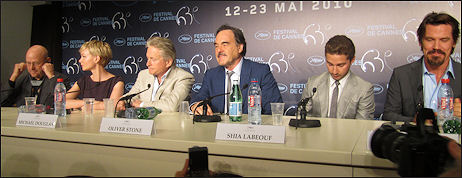
(l. to r.) Wall Street 2c producer Ed Pressman, Carey Mulligan, Michael Douglas, Oliver Stone, Shia Lebelouf, Josh Brolin.
Except he isn’t. The Gordon Gekko of yore was a wolverine, but also a gifted combatant who rationalized his behavior with a harshly realistic view of human nature. “We’re all greedy fucks,” he basically said in Stone’s original 1987 film. “I just happen to be better at grabbing all I can than most.” But Gekko doesn’t “shark” his way into financial triumph in Wall Street 2. He pulls a slimeball move that further ruptures things between himself and Winnie.
Why did Stone and his screenwriters — Allan Loeb and Stephen Schiff share the credit — do this? Because they know Gekko has become a villainous cult hero over the last 23 years, and they wanted to deliver this Prince of Darkness in order to satisfy the fans.
And then comes a finale between Douglas, Lebeouf and Mulligan that tries to sell the notion that Gordon can be forgiven yet again because now he’s really seen the light. This scene is purely and simply a disaster. You don’t buy it, can’t believe it — it doesn’t come close to touching bottom.
The bottom line is that you feel burned and betrayed by the decision to sell out Gekko’s character. You’re with him, you feel for him somewhat, you half-sympathize…and then the filmmakers pull the rug out.
There’s a bit between Douglas and Charlie Sheen at a swanky New York party that gets a rise, but — again –it’s a capitulation to the lore of the ’87 film. The filmmakers didn’t believe or invest in what the new film could have been entirely on its own merits and cultural groundings.
Otherwise WS2 handles itself pretty well. It’s over-emphasizes certain plot points and emotions — it’s overly explicit, playing to the gallery — but the observations about the nature of high finance these days and how it’s all been twisted and corrupted beyond belief or control are spot-on. It’s a reasonably decent film in many respects, but…well, I’ve said it.
Carlos As You Like Him
It was announced earlier today that Olivier Assayas‘ Carlos, the three-part, five-and-a-half-hour epic about the international bad-ass terrorist known as Carlos the Jackal, will (a) premiere on the Sundance Channel as a three-part mini-series in October, and (b) will then be released theatrically via IFC Films in two forms — the butt-numbing three-part version (which will screen in Cannes on Wednesday, 5.19) as well as a shorter theatrical cut that will run in the vicinity of three hours.
Squeeze It In
Every year there are always one or two Cannes market screenings worth catching. I’ve been hoping all along that Sylvester Stallone‘s The Expendables would turn up in this fashion, but with no announcement so far I guess not. So the one to see, I suppose, is Taylor Hackford‘s Love Ranch, which will screen on Saturday (along with four or five other must-sees that day).
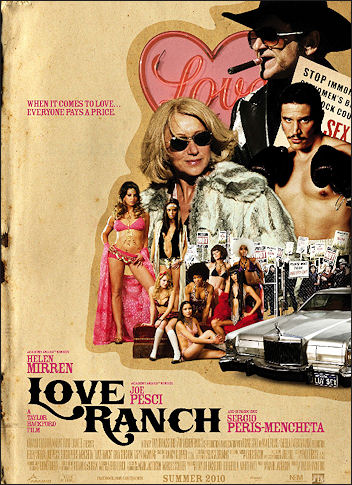
Love Ranch is a ’70s period drama about Joe and Sally Conforte’s Mustang Ranch, with Joe Pesci playing the (in)famous Mr. Conforte and Helen Mirren (i.e., Hackford’s wife) plays Sally. Joe Pesci plays the (in)famous Mr. Conforte and Helen Mirren (i.e., Hackford’s wife) plays Sally — although they’re apparently referred to in the film as Charlie and Grace Botempo.
“Most of us are a little scared, I think, of husband-and-wife collaborations on films,” I noted last month, “as they tend to disappoint, hence the muted enthusiasm about this one. The screenplay, however, is by celebrated author and longtime New York magazine contributor Mark Jacobson, who based it on a story he wrote about the ranch, so maybe.
“The film has been tied up in legal wrangles due to the producers, Capitol Films David Bergstein and Ron Tutor, having failed to make payments on loans and being foreclosed upon in late ’08, blah, blah. But financial boondoggles never prevent a film from being shown at a festival or two, as critical acclaim at Toronto or Sundance can obviously add value to the core asset. If it’s worth showing, there’s always a way.”
I’m aware, of course, that E1, the sales agent, might not want someone like me to show up and potentially post something negative so I may be looking at a challenge.
Jammed
If the people handling or representing Doug Liman‘s Fair Game are reading this, they should seriously consider showing it to press prior to the first official screening on Thursday morning. A certain percentage will be packing or already gone by Thursday (or by Friday morning, 5.21), so it really wouldn’t hurt to show it at one of the commercial cinemas on the rue d’Antibes a day or two earlier. Just saying.
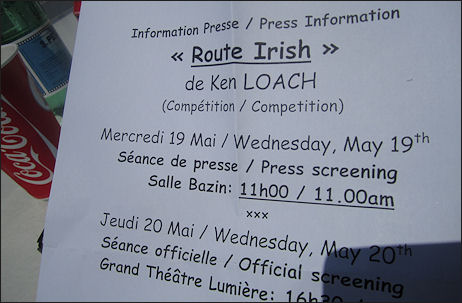
The first screening of Ken Loach‘s Route Irish, a last-minute addition to the Cannes competition slate, happens concurrently with the big Carlos screening, which pretty much everyone is planning to attend. Meaning that the Thursday, 5.20 screening is the one that almost everyone will be catching. (I realize that the information on this notice is misleading due to an apparent misaligning or misunderstanding of French terms, but that’s what it says.)
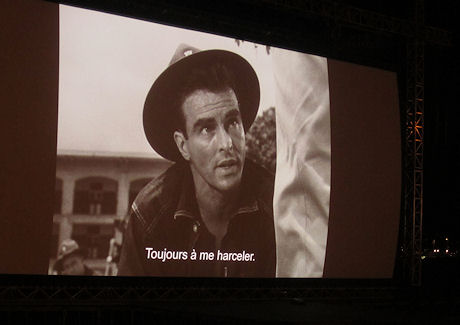
I dropped by last night’s Cinema de la Plage showing of the restored From Here to Eternity, which won’t be out on Bluray until sometime in 2011. Thursday, 5.13, 10:20 pm.
After Twelve Hours…
The problem with my Canon Powershot SD1400 is that it always brightens what it captures. This was shot last night around 9:15 pm with dusk beginning to settle in, and that visual mood is clearly missing here. This is obviously ragged and unfocused, but atmospheric capturings are an essential (but under-reported) aspect of the Cannes experience. It’s important, I feel, to convey the peripheral vibe.
